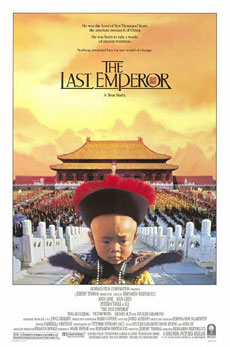The Last Emperor also won Oscars for Best Art Direction-Set
Decoration, Best Cinematography, Best Costume Design, Best Director,
Best Film Editing, Best Music (Original Score), Best Sound, and Best
Writing, Screenplay Based on Material from Another Medium (autobiography
From Emperor to Citizen by Aisin-Gioro Pu Yi).
When we meet Aisin-Gioro Pu Yi, he is just a little boy, summoned to
the death bed of the Empress Dowager Cixi, who bestows her blessing
on him as the next emperor. Immediately, he is taken from his mother
and her simple home and immersed in the gilded extravagance of the Forbidden
City. Imagine being only about 3 years old and having thousand of people
bowing to you. This is one of Pu Yi's earliest memories.
Because he is the emperor, his boyish misdeeds are laughed off, never
punished. It may seem like an idyllic world, surrounded by luxury, and
yet the young emperor is terribly lonely. Not until his brother comes
to visit, when they are both around 8, does he meet a companion his
own age. For the first time, he gets to play like a little boy, albeit
followed and attended by a throng of courtiers.
At about the same time, he learns that his power has become merely
figurative, thanks to the Xinhai Revolution, converting the country
into a republic. His power holds only in the Forbidden City, and he
is treated as a foreign dignitary, confined with the Forbidden City's
walls. While still surrounded by luxury, his life truly becomes a sham.
When he is ousted from the Forbidden City by a warlord, he begins a
life outside the walls, with a brief alliance with the Japanese and
later, interment by the communists.
The movie was based on hours of research into the life of Pu Yi as
well as the appropriate sets and costumes. As accurately as possible,
the filmmakers depict his world. The exteriors were shot at the actual
Forbidden City, which is open to the public as a tourist attraction.
All the interiors, however, were created new as sets.
The use of color helps to contrast different stages in Pu Yi's life.
His imperial life is filled with rich golds and reds. His later civilian
life is a more subdued pallet of earthtones, while the communist world
is sunk in blues. As both the costume designer and director explained
in the "making of" documentary, such color coding was deliberate,
to evoke a mood.
The film, of course, boasts hundreds of extras, to show the grand scale
of life in the Forbidden City. The story begins like a modern fairy
tale, but as political events change the nature of Pu Yi's life, he
leaves the mythic-feeling world for a more mundane existence.
While the film tells the story of one man, it also tells the story
of the millions of people affected by the political changes in China.
Tradition was thrown out the window, and lives were uprooted.
Joan Chen as Wan Jung does not get many lines in this film, but her
on-screen presence is almost constant after she becomes the wife of
the young emperor. Peter O'Toole plays Reginald "R.J." Johnson,
a British envoy who first comes to the Forbidden City as a tutor and
then becomes a trusted advisor and friend.
This is one of the few remaining Oscar movies I had not seen. Now that
I've seen it, I can guess why it won. Oscar voters love important movies,
and this one looked at developments that changes global affairs. The
film was certainly eye-opening; I had not realized that the last emperor
was kept imprisoned in his palace, kept merely as a symbolic power,
for about a decade.
While the movie is grand, the success of it as a film centers on the
personal story. Thanks to Lone's subtle acting, the story shows how
a spoiled young boy becomes a suffering yet compassionate man.
Rating: **** (4 out of 5 stars)


